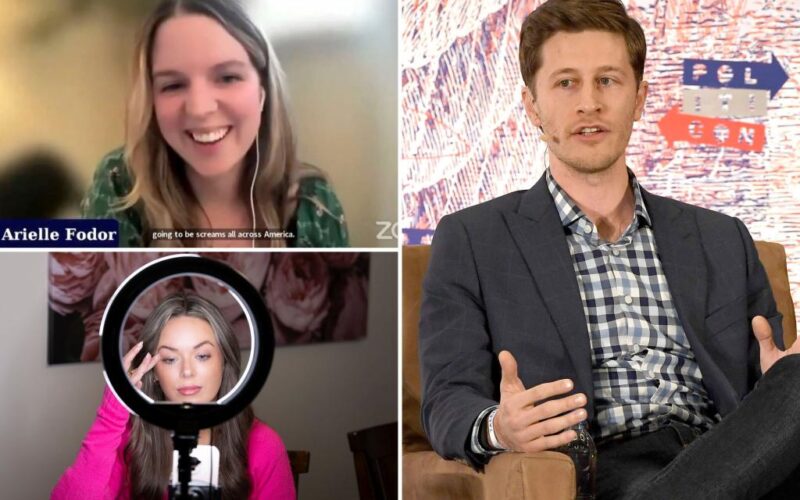A secretive dark money group tied to the Democratic Party is paying online influencers up to $8,000 a month to disseminate left-leaning talking points, according to a report.
The “Chorus Creator Incubator Program” is said to be funded by the “Sixteen Thirty Fund,” a nonprofit sometimes portrayed as the left’s answer to the Koch network and which has funneled money to dozens of Democratic-friendly influencers, according to WIRED magazine.
The names attached to the program span some of the most recognizable liberal voices online.
They include Olivia Julianna, the Gen Z activist who spoke at the 2024 Democratic National Convention; Loren Piretra, a former Playboy executive turned Occupy Democrats podcast host; and Barrett Adair, the content creator who runs a viral American Girl Doll–themed meme account.
The program also includes Suzanne Lambert, who styles herself a “Regina George liberal”; Arielle Fodor, a teacher with 1.4 million TikTok followers; Sander Jennings, the TLC reality star and older brother of trans influencer Jazz Jennings; and David Pakman, host of a YouTube show.
Leigh McGowan, better known to her audience as “Politics Girl,” is also reported to be tied to the program.
Each of them, and many more, were brought into communication with Chorus, the nonprofit arm of a for-profit influencer agency, to take part in the “Sixteen Thirty Fund”–financed program.
In all, Chorus told participants more than 90 influencers were expected to join, according to WIRED.
The arrangement was cloaked in secrecy.
Contracts reviewed by WIRED barred creators from publicly acknowledging the program, disclosing the identity of any funder or even admitting they were being paid at all, the publication reported.
A breach could mean expulsion from the program — and the loss of thousands in monthly income, according to WIRED.
One clause reportedly gave Chorus unilateral authority to demand creators take down content produced at its events.
Another required influencers to route any dealings with politicians through the organization, effectively turning Chorus into a gatekeeper between Democratic politicians and their online supporters, according to WIRED.
Some balked at the restrictions. In a group chat among influencers debating the terms, one pro-abortion creator, Pari (@womeninamerica), quipped, “I believe we are in Stage 5: Acceptance.”
Aaron Parnas, a Gen Z news influencer once hailed as “the Gen Z Walter Cronkite,” is reported to have told colleagues it was “take it or leave it.” Ultimately, many signed.
The program’s secrecy clause was deliberate.
“It avoids a lot of the public disclosure … that you see on political ads,” Graham Wilson, a lawyer for Chorus, said in a Zoom call with creators, according to WIRED.
“Your names aren’t showing up on reports filed with the FEC.”
That omission is exactly what alarms watchdogs.
“For democracy to thrive, we need transparency around who is paying for political messages,” Elizabeth Dubois, a University of Ottawa professor who studies digital politics, told the outlet.
Don Heider, head of Santa Clara University’s Markkula Center for Applied Ethics, was even blunter.
“If the contract says you can’t disclose it, then it’s pretty simple — you can’t take the money,” Heider told WIRED.
Yet the money was hard to resist. In addition to the $8,000-a-month “amplifier” tier, some creators were offered smaller stipends, around $250 a month, to be part of what Chorus described as a larger incubator, according to WIRED.
The collective reach, Chorus bragged in fundraising materials, topped 40 million followers and 100 million weekly views.
Already, the cohort has produced collaborative content. A new weekly series, “Good News in Politics,” featured six influencers — including Eliza Orlins, Sander Jennings and @thezactivist — touting Democratic wins.
The creators encouraged viewers to “follow these creators bringing you hope instead of doomscrolling.”
For the Democratic Party, burned by years of failed influencer outreach, the strategy marks a dramatic shift.
After the Biden White House froze out critical creators and the Harris campaign alienated others, the party is now mimicking tactics long used by Republicans, who have spent decades cultivating a sprawling conservative media ecosystem.
But while right-wing influencers often receive direct funding through PACs or campaigns, Democrats are now accused of using nonprofit intermediaries to obscure the money trail.
The “Sixteen Thirty Fund,” founded in 2009, is no small player. It poured $141 million into left-leaning causes during the 2018 midterms, $400 million during the 2020 cycle, and $196 million on ballot initiatives in 2022.
Just four donors accounted for nearly two-thirds of its revenue last year. Now, through Chorus, that money is flowing to TikTokers, YouTubers and Instagram personalities.
Not all creators welcomed the arrangement. V Spehar, a TikTok star with 3.5 million followers, accused Chorus of using their image in fundraising decks without permission.
Kat Abughazaleh, a progressive YouTuber now running for Congress, told WIRED that she, too, was featured on Chorus materials without consent.
“What we need is investment in independent media,” Spehar said, “not another middleman.”
Some Democratic creators defended the program, including Elizabeth Booker Houston and Allie O’Brien, both of whom were reportedly offered high-paying slots in the incubator. Others, like Keith Edwards, a YouTuber who rose to prominence last year, blasted it as “predatory.”
The Post has sought comment from the influencers named in the article as well as from “Sixteen Thirty Fund.”
“Yes, I have received compensation to supplement years of previously unpaid work,” Piretra told the Post.
“The fund supports content creation sustainability while maintaining zero ownership, editorial control, or messaging input — they have no approval process, no deliverables requirements, and no review or oversight of what I create.”
Piretra said that “the expectation that creators should indefinitely absorb all labor costs without compensation is neither sustainable nor reasonable.”
“When my content is funded by an organization or vetted cause with shared values, you’ll see a clear disclosure,” Piretra added.
A spokesperson for the Sixteen Thirty Fund told the Post: “Chorus is doing crucial work to spread a pro-democracy message to Americans. Creators working with Chorus have always been encouraged to talk about their involvement in the program.”
The rep said that as a nonprofit, “Chorus creators are not paid to support candidates, but they are free to do so in their own time.”
“Sixteen Thirty Fund’s work with Chorus is limited to our role as a fiscal sponsor,” the rep said.
“We process donations on Chorus’s behalf but are not the original source of funding.”








